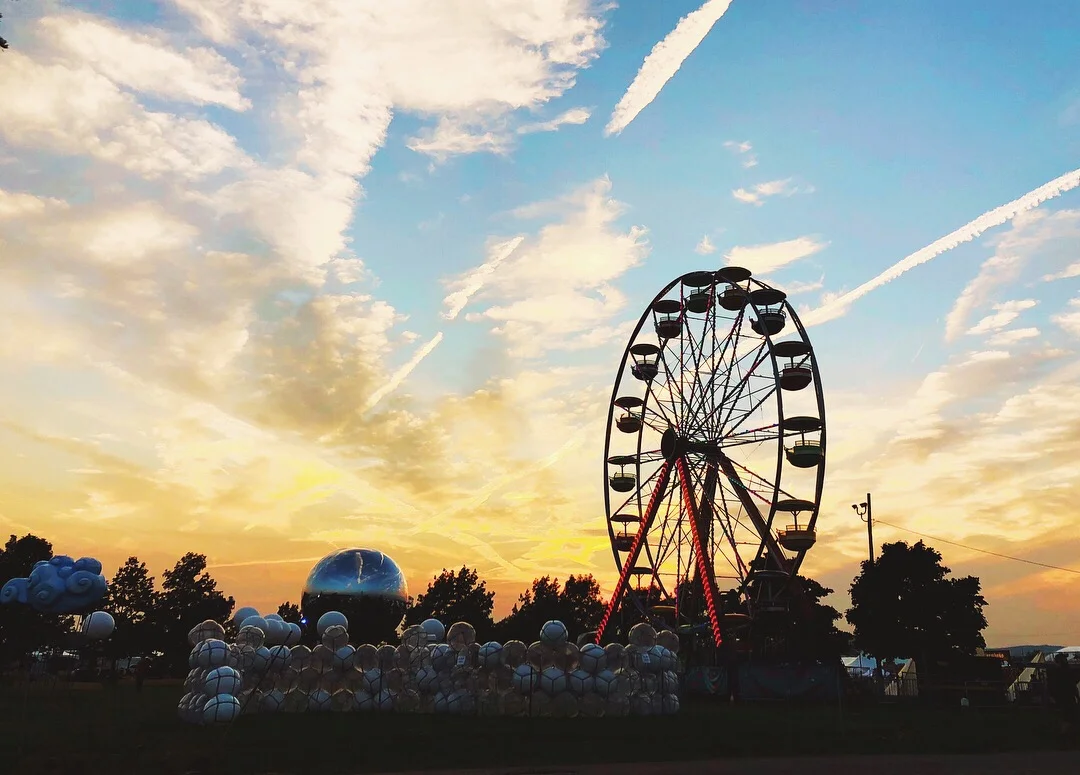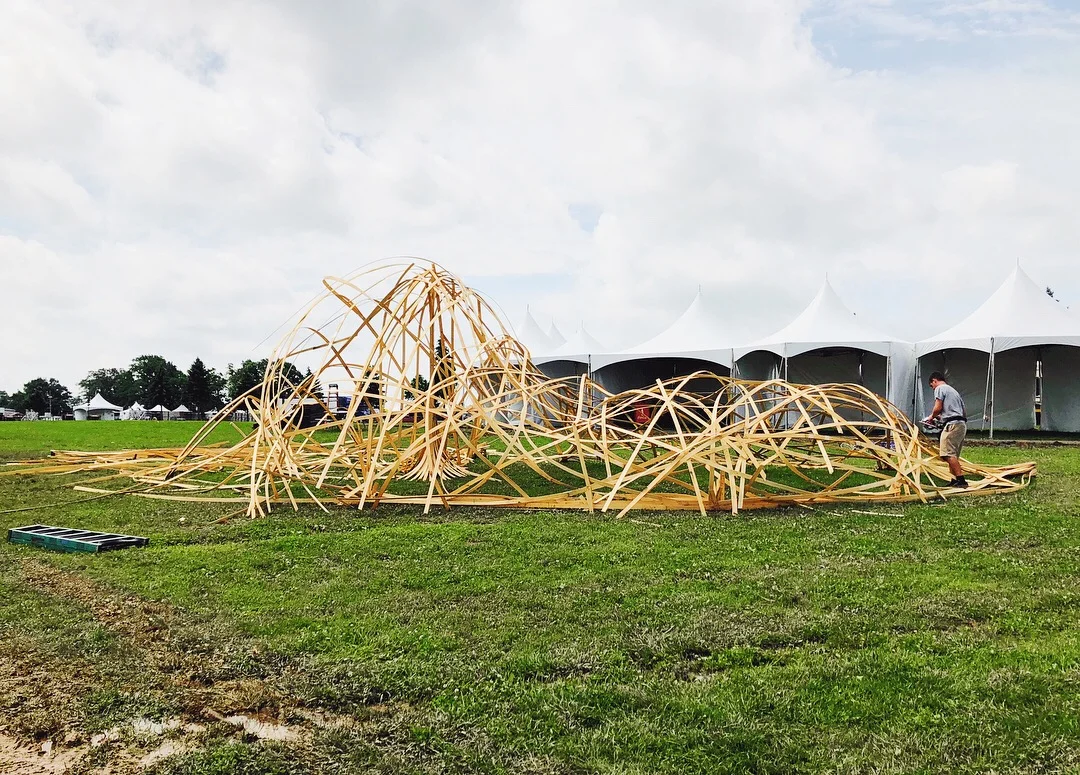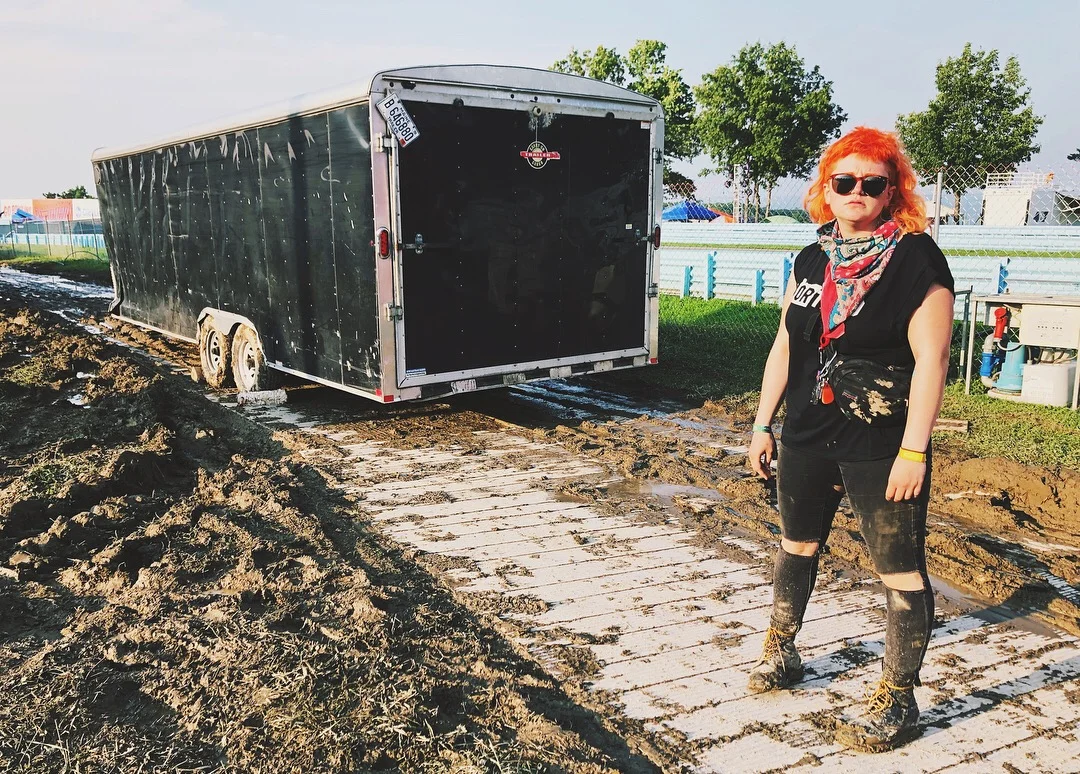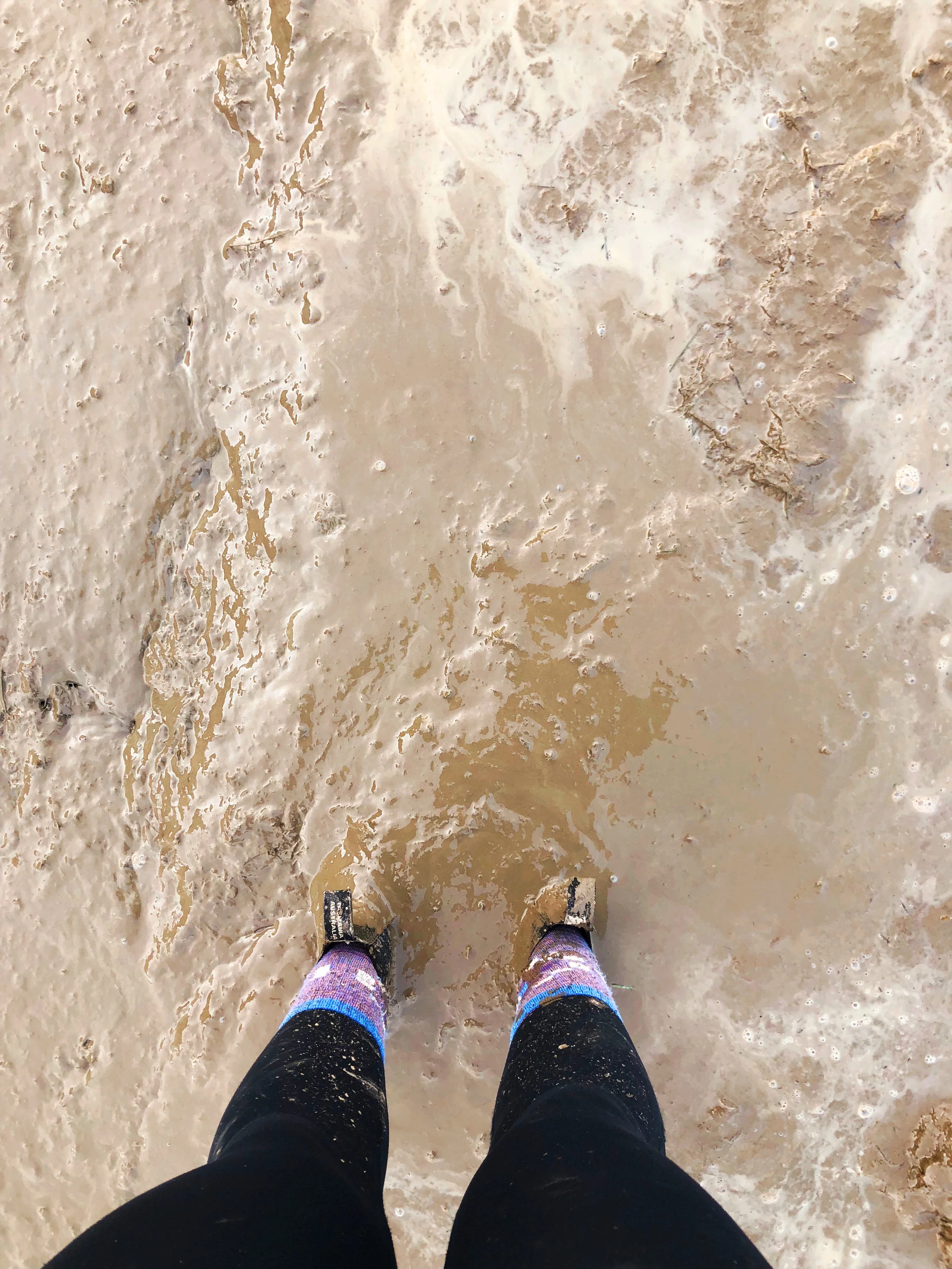I walked by a man using a circular saw to dismantle a complex formation of thin, cris-crossing pieces of wood. Each segment was 15, 20, 25 feet long or so, combined and separated to create a 3D space below, through which a twisted pillar acted as a centerpiece. The formation was interactive art—something you could look at or sit inside and appreciate either way. I had watched the very same man that was cutting it apart put the finishing touches on it the day prior. He had secured each piece by agonizing piece, a labor of love only someone so dedicated to their art could possibly withstand.
It was Friday and there were supposed to be 35 thousand people milling around appreciating the Curveball festival grounds and everything that made them special, including this piece of art. Instead the fans were almost all gone, and everything was in some state of tear down. Phish’s 3-day festival, which had drawn fans from all over the country, had been cancelled at almost the very moment things were ready to go. 8 inches of rain in two days had flooded Watkins Glen and left the local water purification facility contaminated. There was no clean drinking water, so the festival couldn’t obtain the permits it needed to operate and open the gates. The health department called it off and told everyone to leave.
I hesitated as I walked by the artist. I was on my way to “my row”—the stretch of vendors on the right hand side of the stage that were my responsibility. I had to check in and make sure they were on track to get out of the grounds as soon as possible, and to provide any assistance I possibly could. Some combination of compassion and curiosity told me that could wait two minutes, and I walked over to talk to the man cutting apart the structure I had walked by countless times that week. The artist’s name was Randy. He was on the visual team for the festival—the wizzes who dream up and create the beautiful spaces, sculptures, installations, etc. that turn the grounds from a mere concert to a beautiful city for the guests to explore. Tears leaked out of my eyes as he explained to me the behind-the-scenes efforts I hadn’t seen in creating his work—he and his partner had spent two days taking shelter amongst the portapotties as rain thundered down, up to their ankles in mud, determined to keep working because of how badly they wanted to make their project happen. My heart was broken already, but as I hugged him and tried to convey an understanding of his pain, sorrow at the circumstances, and appreciation for his art, the crack deepened a little further.
I have never been to a Phish show. I’ve never listened to their recorded sets online, or watched one of their live sets on tv. I had never heard of The Bunny or goo balls and I couldn’t even name the members of the band. I wasn’t here to see them; I came to work on the vendor coordination team, something I’m pretty comfortable with after years of working large-scale events. I committed to the gig mere weeks ago and was excited for the opportunity to see a new fest, and meet some new friends. I had never understood the intense, specific, cult-like culture around Phish and was interested to see what it was all about during my time at the festival.
My favorite thing about working a show on the production side is watching a venue go from ground zero to the complex mini-metropolis that the patrons come to know and love. Over the course of about a week, we literally build a city from an empty field. Some lucky swath of land gets markings according to a map that tons of people have “advanced”, and ideas are turned into tangible numbers, measurements, and marked-off areas. Tents are raised, power is laid, and water is turned on. Once the very bare bones of society are in place, the makeover begins and the festival develops character with each department working 110% in their zone to make sure that their role is fulfilled. New structures appear on the horizon: new landmarks, new activations. Everything is shiny and freshly-painted and beautiful. Completely pristine. You wouldn’t believe how much emphasis is placed on staying off of front-of-house grass.
I arrived on-site the Friday before the show opened to start setting up shop for the vendors. That meant laying flags to indicate where power lines needed to be dropped, scoping out marked-off areas and back-of-houses, and generally assessing any potential problems before they arose. The goal was to have the vendors’ tents, power, and water in place before the vendors actually arrived so that they could simply arrive, set up, and prepare to sell.
There’s this Danish concept called janteloven. It’s the idea that every member of a society is equally important — from the doctors to the teachers to the sanitation workers— because without any specific piece of the puzzle, the society would not function properly. Festivals are a pretty clear enactment of this law: every department is absolutely critical to the festival’s success. Catering exists to feed the people to build the stage to hold the music to please the people eating vendor food next to the beautiful art… it’s all intertwined.
Over the course of my week on site, I watched the other departments work with fascination and awe— specifically, the visual design team. The festival world is small and it’s pretty inevitable that you’re going to make friends from having trailers next to each other, eating catering together, or simply working along side each other from festival to festival. I watched these new and old friends of mine do all kinds of crazy crafty things to bring the festival’s essence to life through carpentry, spray painting, and 3D-art. They curated eclectic furniture, made disco balls out of CDs, and added flare everywhere flare was needed. They spent an entire day on 20-ft ladders hanging gigantic swaths of fabric that turned into ceiling drapes. They took an enormous, plain, empty tent and turned it into the sweetest disco party and bar. With awe, I watched their progress, knowing how much the fans would appreciate the beautiful fruits of the design team’s labors.
Site days are long: 16 hours is standard, more than that is not uncommon. My team was frequently on site at 6 AM and would leave around 10 pm. Sometimes those numbers shifted, or stretched, but easy days didn’t exist. We walked 7, 8 + miles running laps around our "areas", back and forth to the trailer, over to this campsite, back to catering, back to the area, over to that campsite. All of the little worker bees buzzed around taking care of their various jobs, working toward the common goal of getting the site open on time for the guests. Building the festival is always exciting and chaotic as well as completely and utterly exhausting, but it’s worth it once the gates open and the guests come to inhabit your little, temporary city-- a city that has never and will never exist in the same way. Next year, the theme, decorations, installations, and activations will all be complete different--that's part of what makes it so special.
The pre-show was, to be completely honest, brutal. It rained almost every day, and the ground was a swamp. Spontaneous rivers cut through roads and across fields. Giant muddy swimming pools appeared in my vendors’ tents. You got drenched walking the 10 steps from your trailer to your golf cart, and virtually any task that had to be accomplished not only became much less enjoyable, but also took about 10 times longer than it would have otherwise. It’s mildly inconvenient to be building anything outside when it’s raining, but it’s frustrating as hell to be creating a city during torrential downpour.
There were countless problems early in the week. We blamed it all on mercury being in retrograde, but regardless of what you called it, the universe was really kicking us in the pants. More than half of our team members’ flights were cancelled/delayed and my boss and I had to split six people’s jobs between the two of us for the first day. There were keys locked in cars, spilled beverages, lost items, incongruent logistics, meddling third parties, countless bizarre mishaps, delays, miscommunications, high tensions… I even got hit in the head by a 2"x4". And of course it was raining the entire time. Curveball after curveball after curveball.
As the week wore on, I spent most of my time rescuing vendors from literal pools of mud. A fake road had been laid, but that didn’t matter when each vendor’s massive, 15,000-pound trailer would stray even six inches off the skinny metal road. As heavy vehicle after heavy vehicle attempted to get to their zone, the wet grass disappeared, replaced by ruts up to my ankles and shins. Trailers, refrigerator trucks, box trucks, smokers, and gigantic woodfire pizza ovens alike were all sucked into the mud and almost everyone needed to be rescued by a forklift at one point or another. Everyone was stuck, and everyone was frustrated. I felt like a pinball bouncing from disaster to unsolvable disaster.
Festival vendors don’t have it easy— they travel long distances, do a crazy amount of heavy lifting, and work absurdly long hours to maximize their revenue in the short timeframe they have. If things aren’t perfect when they arrive, it sets them back from getting everything prepped for the show. As vendors lost half a day, a whole day, a couple days due to delays from the rain, tensions continued to mount and the fear of missing out on revenue grew larger. After a chaotic and exhausting 72 hours, my row FINALLY finished loading in on Thursday around 10 AM, a benchmark we should have reached Tuesday evening. We had lost so much time but at long last the teams were making over their booths and preparing food. Even though we were still waiting for a fresh water spigot to be installed and a number of minor electrical fixes, we were finally almost ready.
It was so cruel it felt almost violent, to have been so close and have it all yanked away. The campers were streaming into the campgrounds, the band was about to soundcheck, and I had just watched my visual design friends painting the finishing touches on their incredible artwork. The t’s were getting crossed, the i’s dotted. There were a number of problems that still needed addressing, but they were nothing that could have derailed the whole show: the show would go on. When it comes to such a large scale event, having to throw bandaids on problems is the name of the game. I’ve seen a site partially wrecked by hurricane winds one night, back up and running the next day. I’ve seen floods, evacuations, cancelled sets, rearranged times, closed areas, etc. But a show is so much bigger than any single person or group or thing that is a part of it that once it’s in motion, it’s incredibly difficult to derail it. Things may not be perfect, but most of the time, the big picture is so distracting that the people who matter (the fans), don’t really notice or mind the smaller mishaps. It had never even occurred to me that canceling the show was a possibility, until the moment I heard those words come out of my boss’ mouth.
There was a brief pause in activity, the calm before the sneaky storm. I found myself slowing down because there were finally fewer things to do; my pre-show job was pretty complete. I paused to talk to my vendors about things besides issues. The venue was set to open once soundcheck ended and everyone looked like they were going to be ready. I was looking forward to the show for many reasons, but mostly I was excited for a little time to relax. The major work and chaos for my job comes during load-in and load-out, and everything else is just troubleshooting and maintenance. Show is always so rewarding because every moment and dollar and effort that it took to get all the people into this place becomes worth it. All of the strategizing and organizing and traveling and building comes to its peak as everyone plays their role to the fullest. For the vendors, it means they get to show their love to the guests in the form of their delicious food. It's not simply about consuming calories or making money: it’s about revealing the joy that is intertwined with a gigantic piece of Spicy Pie, a vegan crepe from Skinny Pancake, or an ice cold Bear Claw coffee depending on the time of day.
My boss called a vendor meeting at 5:30. We corralled every vendor we had welcomed into the venue over the last week, the same ones we dug out of the mud, fixed endless credential and parking issues for, and fielded phone calls from at midnight. At 5:29 she told me what it was about. Unfortunately, a link with news of the cancellation was blasted out mere minutes before the event manager delivered the official press release to the gathered vendors, and the air was thick with emotion as the Watkins Glen representative confirmed that the festival was in fact cancelled. My boss spoke to the vendors after her, and I felt immense pride at her incredible grace, compassion, professionalism, and personalization. She had put thousands of hours into this show, dealt with gargantuan roadblocks, beaten down proverbial brick walls, and hadn’t slept properly in weeks. I mean, like, waking up at 2:30 am to start the work day. She is a quick-witted problem solver, a hilarious woman, and has harnessed a fierce tenacity to achieve her goals, despite her role in a thankless and monumental job. As an emotional sponge myself, I don’t think I could possibly have stood up there and declared that everything I had been working toward for months, all the battles, all the budgets, all the hours, would never get their payoff. My heart ached for her, and for the people in front of her—all of our vendors who had travelled great distances, and been tossed around by issue after issue all week; who had invested thousands of dollars in coming here, and now were being told to leave. There was talk of insurance policies, the EPA, immediate evacuation, strategically placed palettes where safe drinking water was available. I finally understood why my 19 calls to get the water line dropped at stage right ASAP PLEASE was ignored so completely. I watched the stages of grief cycle through as most people floated somewhere between denial and depression, with a few “angry”s. The meeting ended, people took a couple minutes to figure out a plan, and then everyone dispersed.
Motion resumed at a startling pace. Over the next few hours, the site was destroyed before our eyes—everyone’s work from the last days, weeks, months, was torn apart, dismantled, intentionally unwoven. The Strike process is normally cathartic: an incredibly fitting end to the duration of your time on-site. All the energy, frustration, blood, sweat, and tears that go into building a site— the endless phone calls and meetings, herculean manpower, favors called in, sleepless nights— it’s all worth it to experience the community that flows from the space you helped cultivate. There is nothing like the collective energy of beautiful, loving souls who come together in the name of art; it brings a perma-high that carries you through to the end of the gig. Strike usually moves quickly because the longer it takes, the more you dip into your profits. In a situation like this where all the promised revenue disappeared, the pace was positively frantic. Every moment paying staff was another dollar lost, and a further dip into the red, something everybody involved wanted to minimize from the festival staff to the vendors to the venue. The massive team that had built the stage reappeared and broke it down at a startling pace; the skyline shrank as the ferris wheel was dismantled, art installations were destroyed, and signs were taken down. The craft vendors’ boxed up their perfectly displayed goods, and each of my food vendors thought hypercritically about what to do with their ~$10,000 worth of food that wouldn’t get used this weekend. It was Strike on steroids, without anyone getting to experience what we had built. And it was devastating.
It’s always humbling to see how adversity makes people come together. That night, the tension of the previous week dissipated as we all mourned together. Humanity came out to shine as everyone slowed down, looked each other in the eye, offered hugs, help, beer. We stopped to look at the festival and tried to appreciate it as much for each other as the 35,000 guests would have. Vendors that could spare it gave away their food. We held each other and cried as we actively tore down this city and pushed people out.
I was surprised by how much of a reaction I felt. I’ve never seen Phish, (and honestly, have always thought that the Phish fam is a little crazy) but I was stoked to finally see what it was all about. I knew people that were coming from far and wide, by train, plane, and automobile to this middle of nowhere place to see a band they had already seen 137 times. I wanted to get a taste of the passion and unparalleled vibes of what I had heard described earlier in the week as “the greatest band in the world”. As reality set in, my heart broke for everybody in this little niche world—for the people who had been working on this show for months, connecting, planning, picking people to help make Phish’s dream a reality; for the vendors who sacrificed so many other opportunities for a bunk weekend; for the artists whose art would go unseen; for the band whose party had the plug pulled just as the guests were arriving; for the fans who took time off from work, who traveled so far, who had been looking forward to it for months. There was no winner in this situation, and oddly enough there was also no enemy. The logic just didn’t add up— the rain had stopped, the thing was built, the people were there, the party was literally about to start, and yet everyone had to leave. It felt even more heartbreaking because of this invisible, obliterating force.
Today is Sunday, and I’m headed home. The site is a ghost town, stripped back down to the bare bones. The guests and vendors are long gone, and most staff have already left as well. It’s hard to believe that I would have seen my first eight Phish shows by the end of today. To say the least, I’m disappointed about this week, but I’m damn proud of the epic festival we built, even if no one got to see it. I’ve been reminded of the power of music, and art and the connectivity that I love so much about festivals, and I aspire not to lose sight of the grounded sense of humanity that coursed through Watkins Glen this weekend. I still haven’t seen a Phish show, but I know two things after my week at Curveball: 1) anything that inspires so much beauty, community, and unfaltering love is something I can support with a full heart. 2) There has never been a more aptly named festival, ever.





